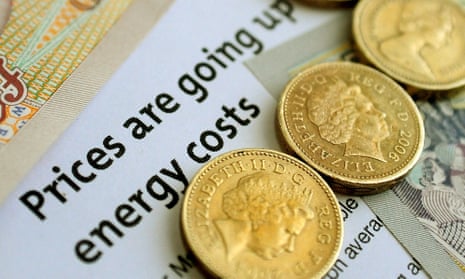Householders face steep hikes in electricity bills next year, as EDF Energy said it would raise prices by 8.4% from March, with other “big six” energy providers expected to match the increases.
The French-owned energy giant, which in September signed an £18bn deal to build the controversial Hinkley Point nuclear plant, said it would cut gas prices by 5.2% but blamed rising costs for the increase in its electricity tariff.
Experts urged customers on standard tariffs to lock into cheap fixed-priced deals while they were still available.
The changes mean that dual fuel customers with EDF (taking both electricity and gas) will see their bills rise by 1.2%, to an average of £1,082 a year. Prepayment customers who take both gas and electricity from EDF will still pay 5.1% less after March, at £1,081 a year.
Wholesale energy prices have risen by around a third since last spring, and Mark Todd, co-founder of Energyhelpline, said EDF’s rise is likely to be “the first of many”.
It is also the first major price rise since the collapse of GB Energy in November. The three-year-old gas and power supplier, which pulled in 160,000 customers with cheaper tariffs, blamed “swift and significant increases in energy prices” for its failure. Fears are now growing that other “challenger” providers could fail, and leave the big six in a stronger position to raise prices.
Todd is predicting average rises nearer to 5%. “We urge consumers to take this as proof that price rises are definitely coming and to use it as a catalyst to get off the horrible standard tariffs that make so many cold and penniless, and get onto a nice low-cost fixed rate that makes heating your home affordable,” he added.
EDF said that 1.5 million customers would be unaffected because they are locked into fixed-rate deals. It said it would write to those on standard variable tariffs and provide details of its best deals.
Beatrice Bigois, managing director of customers at EDF Energy, said: “Many industry commentators have said that prices charged by energy suppliers will rise after the winter. We are being open about the fact our electricity prices will go up after our price freeze. But we also know it is right to pass on to loyal customers the fall in gas costs that energy suppliers have seen over recent months.”
But critics said EDF was raising electricity prices when much of its power was already generated from nuclear plants.
“EDF is in the unique position of owning all the UK’s nuclear power stations so they don’t actually need to buy any electricity. This means that they have been largely insulated from the turmoil in the wholesale markets that has seen 35% wholesale price rises since March and put GB Energy out of business. These wholesale rises are putting much more pressure on other suppliers to hike rates than EDF,” said Todd.
onsumers.
EDF is first of the big six to announce that an increase in prices is in the pipeline. British Gas and SSE have both frozen the cost of their standard tariffs over the winter months.
Claire Osborne, energy expert at uSwitch, said: “It’s disappointing to see EDF already committing to price rises in March that will make them the most expensive variable tariff of the big six. Increasing the price of an already high energy bill could leave almost 2 million EDF standard variable customers buckling under the pressure, and it’s a bitter pill to swallow even if it is after the winter months – consumers still need to keep the lights on.
“With wholesale costs rising, putting further pressure on bills, we have already seen the cheapest deal rise by £126 in the past two months, and the danger is now that the other big six suppliers will follow suit with their own price hikes in the spring.”
However Guy Anker, managing editor of Moneysavingexpert, said the price rise was lower than expected given what is happening to wholesale prices.
“Nevertheless, no one should see this as good news and it should sound as a loud clarion call to any customer of any energy firm on a standard tariff to urgently check if they can save by locking into a cheap fix, as other firms are likely to follow.”
He added: “Urgent is the key word as the price of the cheapest deals has been rising, so the longer you wait the less you’ll save if that trend continues.”

Comments (…)
Sign in or create your Guardian account to join the discussion